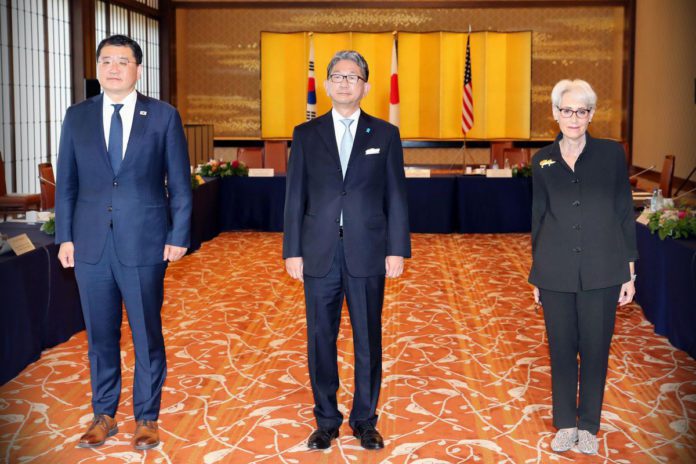Study finds alliance is worth trillions to South Korean economy
Many experts worry that the Moon Jae-in administration’s unilateral attempt to declare an end to the Korean War before the next presidential election in March could negatively impact the U.S.-Korea alliance.
This is because the declaration would weaken the legitimacy of the U.S. forces, as well as the United Nations Command, stationed in South Korea. Both North Korea and South Korean leftists would argue for their withdrawal due to the war being “over.” However, a report came out at the right time to remind South Koreans of the importance of the alliance with the United States.
The Korea Economic Research Institute released a report analyzing the value of the alliance with the United States on November 17 to celebrate the 67th anniversary of the Mutual Defense Treaty between the United States and South Korea, which went into effect on November 18, 1954. The report by the institute showed that the negative economic impact from no alliance with the United States would have amounted to 3,041 trillion won ($2.57 trillion) in damage to the South Korean gross domestic product (GDP) from 2000 to 2020. This paper builds on earlier research by Kyle Ferrier from the Korea Economic Institute in Washington, D.C., that found the alliance was worth $2 trillion to the United States in addition to intangible benefits to the entire region.
The institute analyzed the economic impact of the vacuum in South Korea’s defense capability followed by the withdrawal of U.S. forces and other assets due to a weakened alliance relationship. It studied the additional defense budget that South Korea could have allocated depending on the various scenarios, which include a lowered credit rating due to increasing geopolitical risks due to the withdrawal of U.S. forces. The three scenarios of the study include allocating a budget to fill the gap of the U.S. forces once and paying additional costs every year, raising the military budget by 50 percent, and raising the military budget by 100 percent.
The institute concluded that the damage to the South Korean GDP would range from a minimum of 928 trillion won ($785 billion) to a maximum of 3,041 trillion won ($2.57 trillion).
“The United States is South Korea’s historical and military ally established by blood that lasted for over 60 years,” the report said. “A strong alliance is essential for South Korea’s economy to be stable and achieve sustainable prosperity.”
Choo Kwang-ho, director of economic policy at the institute, added that “South Korea was able to achieve rapid economic growth and economic prosperity after the Korean War under the free market system, and the biggest pillar behind this achievement was the strong alliance with the United States.” He continued that, “We need to maintain the strong alliance with the United States to maintain the groundwork of the sustainable economic prosperity.”
The United States, South Korea, and Japan are holding trilateral vice-ministerial level meetings this week in Washington D.C. Choi Jong-kun, First Vice Foreign Minister from South Korea, told reporters on November 15 that the three countries do not differ on pushing ahead with the declaration to end the war. He said he will be discussing details such as when and how to achieve the declaration with his counterparts.
During a keynote speech at the Korea-U.S. Strategy Forum co-hosted by the Korea Foundation for International Relations (KF) and the Center for Strategic and International Studies (CSIS) on November 15, Choi argued that it is important to create a framework for inescapable peace on the Korean Peninsula. He argued that the declaration of an end to the war is a good way to do this.
“Our focus is on building a lasting structure for engagement with North Korea,” he said. “The peace process can be long, arduous and painful.”
Choi met with Wendy Sherman, Deputy Secretary of State, on November 16. The South Korean foreign ministry released a statement saying that “they assessed the progress of the Korean Peninsula Peace Process, including the end-of-war declaration issue, and agreed to continue their cooperation to bring North Korea to the table.”
However, the U.S. press release did not mention the end-of-war declaration. Ned Price, the spokesperson for the State Department, said, “the two also discussed the DPRK and our shared commitment to the complete denuclearization of the Korean peninsula.”
“Deputy Secretary Sherman and First Vice Foreign Minister Choi reaffirmed the U.S.-ROK Alliance as the linchpin of peace, security, and prosperity in the Indo-Pacific and beyond,” added Price. “The Deputy Secretary welcomed the ROK’s regional and global leadership and stressed the U.S. commitment to working with allies and partners to defend the rules-based international order.”
Washington’s continued reluctance to follow Moon’s hasty plans to end the war may put the alliance in trouble, especially if pro-North Korean candidate Lee Jae-myung wins the presidential election next year.


